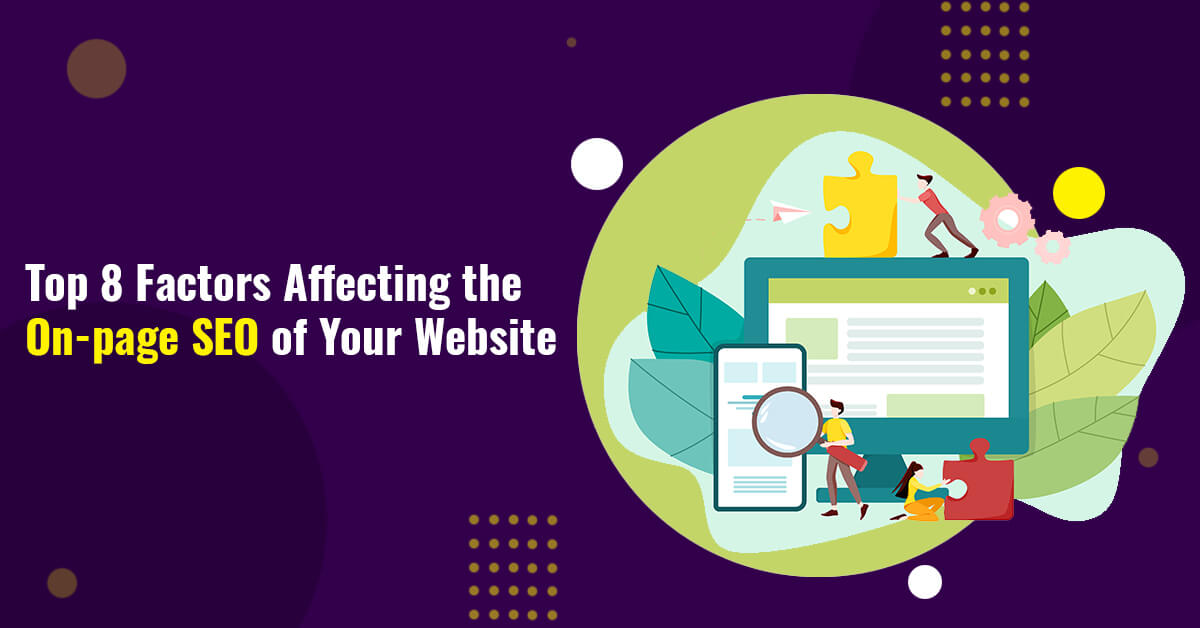Top 8 Factors Affecting the On-page SEO of Your Website

Having a successful SEO strategy is of paramount importance for businesses nowadays. With every other competitor trying their best to score the top rank in the search engines, you would certainly lag behind in the race if you haven’t invested in developing an effective SEO campaign yet. Hiring affordable SEO services in India is hence, the next big thing to do for you to optimize your website in the best possible way.
While considering the process of developing an SEO strategy, you need to focus on both On-page SEO and Off-page SEO. On-page SEO focusses on the practices or techniques of optimizing the pages of your website to increase the amount of organic website traffic by improving search engine rankings. On the contrary, Off-page SEO relates to all the techniques that are being implemented outside your website for building internal links and improving the site’s trustworthiness and authority. In this web blog, we would emphasize on the vital factors that you must consider while creating a strategy for On-page optimization.
Title tags
Though it might have a nominal impact on the organic ranking of your site as visitors mostly search by using keywords in the search engines, the title tag offers a primary clue of the topic being searched. Hence, issues related to duplicate or missing title tags might impact the SEO results of your website adversely.
Meta descriptions
Meta tags are used for offering the page’s description on what it is all about. They help in improving the quality of your SEO results, and ratings as well.
Links
There are three types of links which, you need to consider for On-page SEO. These are as follows:
• Inbound links: The search engines make use of inbound links for determining how much relevant and authoritative the content of your website is.
• Outbound links: Outbound links are being used for showing that you’ve been developing quality content for users.
• Internal links: By linking your own contents, you can tie the web pages for both the visitors and search engines thereby, increasing the value of your pages.
Page loading speed
Another important On-page SEO factor is the loading speed of your web pages. As search engines mostly focus on delivering an improved user experience to users, they will always prefer sites that has a faster loading speed.
Header tag
These are mainly used for identifying the heading of your content and indirectly affect the search engine rankings as well by mentioning the relevant keywords.
Mobile friendliness
With smartphones and other mobile devices becoming the primary source of surfing Internet, it has become important for you to ensure that your users can browse through the web pages of your site on their phones and tablets. Mobile friendliness specifies on how a particular website appears and functions when it is being opened on the mobile. So, you need to ensure that your site is mobile-friendly and make use of open design which, can adjust the content as per the device. Hence, if your website isn’t being mobile-friendly yet, it might affect your SEO rankings negatively.
Content optimization
This method focusses on developing most useful content that can reach the maximum number of audience. In the process of optimizing content, you need to ensure that all the associated keywords are being included. As experts suggest, it is always better to assign a specific keyword to each of the pages for optimizing the contents at their best.
E-A-T (Expertise, Authoritativeness and Trustworthiness)
Last but not the least, you must focus on the systematic framework introduced by Google that helps in assessing the web pages, contents, and websites in an overall basis.
• E for Expertise: This concerns to check whether author of a specific part of the content is having adequate knowledge and skills in the specific field.
• A for Authority: This refers to check whether the site or web page is the right source to answer the search question.
• T for Trustworthiness: This checks whether the author delivers an authentic presentation on the subject relevant to their content.
The bottom line
All these above-mentioned factors are certainly to be focussed on for developing a result-driven on-page SEO strategy. However, professional help of experts is always recommended as analysing all these aspects with limited knowledge and expertise won’t be the right thing to do. Hence, look for professional and affordable SEO services in India to craft a business-specific and highly effective on-page SEO strategy.
Liked our blog? Stay tuned for more interesting blogs like these on all kinds of news and insights relevant to our industry. Keep following us!
